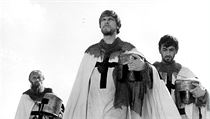One of the most interesting Czech post-war actors, Petr Čepek, was able to celebrate his 80th birthday on Wednesday. However, he died prematurely in 1994, and although the cause of malignancies cannot be determined, he was caught up in what he had lived in before.
Čepek never reconciled himself to the marasmus brought about by normalization. He tried to live so as not to betray his views, and it was a constant dance among the eggs. This way of life was mentally exhausting and destroyed people from within. And it still seems that part of the nation still can’t understand this, and we are increasingly confronted with the opinion that nothing really happened to anyone during normalization.
MACHALICKÁ: About theaters and fighters for themselves |
Čepek’s death is popularly demonized as a result of an encounter with the role of Faust, which he played in Švankmajer’s film, but there was nothing demonic about the constant existential pressure he experienced, it was a disgusting reality.
He has been principled since he was a student when his classmate Ladislav Mrkvička took the tram pulley for fun at the Majáles in 1962 and was arrested. They wanted to kick him out of school just before the end of his studies at DAMU, and his classmates were to vote on it, Čepek refused to take part in it and left school with Mrkvička to protest. He didn’t even accept a role in the series about Zeman in the repulsive works of Clowns and Štvanice, and subsequently had a lead on Barrandov, but director Sequens assured him that his door was always open…
MACHALICKÁ: The next president? It is possible that Pavel Novotný is the politician of the future |
Although Petr Čepek did not reach a new era in full bloom, I cannot imagine that he would be willing to devalue his acting in stupid series, fool around in television shows and competitions, perceive acting and theater as a creative artistic profession as an opportunity to communicate worldview.
He connected his life with the Drama Club, where he came from the Petr Bezruč Theater in Ostrava, he was enchanting and inner on stage, and he was also an essential comedian. He remained in the theater even in bad times, when its founders (Jaroslav Vostrý, Jan Kačer and others) had to leave, and he was also a natural moral authority of the ensemble, although he was often fed up with what he had to play in.
Even though he left so early, remembering him brings pleasure. But then a text (internet Krajské listy) about the opera singer and standardization director of the National Theater Přemysl Kočím falls into one’s hand and he learns in it that he was an excellent artist and a man, he only had a weakness for women. All his crap goes away with the fact that he is said to have been politically involved.
As you can see, Kočí can also be put in a pantheon of decent people, because there are a few witnesses. After all, when he died, it was a surprise for the young artists that a funeral from the National Theater could be an insult to his victims. Kočí was a vengeful and insidious servant of the regime, he liquidated people mentally (for example, Karel Höger) and with gusto threw out the so-called old guard of the ND drama, which he knew she had never identified with the regime. And it came to pass, as soon as he had done that which was laid upon him, he was cast out, as was good custom. He then twisted everything appropriately in the memoirs he published twice, after 1990 he adapted them appropriately to the new era.
–



